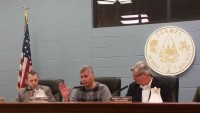Residents Continue to Fight Carmel’s Proposed Mass Gathering Law

Carmel town board members announced changes to a controversial planned law requiring town approval for mass gatherings at their Jan 20 meeting, but some residents continue to insist the law isn’t needed at all.
The proposed law, Local Law 44, regulates parades, events and street closings by requiring the organizers of an event to get permission from the Carmel Police Chief. Applications must be approved or denied by the police chief within 30 days of receiving it, and denials can be appealed.
The law originally required the applicant to pay for applicable parade permits and fees, with three different fee levels based on the amount of police hours needed to support a given event. But Carmel Town Councilman Frank Lombardi told residents on hand just before a public hearing on the law the board was changing language to waive the fees for the immediate future.
“The right thing to do is if there is ever a time when we as a town feel that it requires financial assistance from those who organize the parades, we will have a public hearing for everyone who is able to participate to hear reasons for and against it,” he said.
Despite the change, several residents used the public hearing to tell board members the law was unnecessary. Among them was Pat O’Malley, Chairman of the Northern Westchester-Putnam St. Patrick’s Day parade.
“The general consensus of the majority of the parade committee is that there really isn’t any need for this law to come into play,” he told board members. “We’ve been doing this parade for 40 years.”
O’Malley said his organization raises funds each year to pay for associated costs such as insurance and advertising.
“To add fee schedules and more costs to the parade, it’s going to crush us,” O’Malley said. “It’s going to force us to not be able you put a parade on in Putnam County. We’d have to look elsewhere, and we don’t want to do that.”
The idea of paying police to work such events on behalf of residents was redundant, he added.
“That’s their function,” he said. “That’s what we pay our taxes for. That’s the prime mission of any law enforcement agency – public safety.”
Fellow parade committee member John Malloy said the right of groups to assemble was protected by the First Amendment of the U.S. Constitution, and argued that the law’s definition of a gathering was far too ambiguous to be enforced.
“Any effort by any government arm to remove part of that right has to be supported by a public safety reason,” Malloy said. “That’s the only reason you can do it.”
Events like parades were a benefit to the town that outweighed the cost, Malloy said.
“This is something people do for the town to show the town in the best possible light,” he said.
Malloy said the best thing the town board could do to offset costs associated with events was work harder to attract new businesses to some of the numerous vacant commercial properties along Route 6.
“If you’re looking to defray the cost of the police at the parade, you build one building in one of these vacant lots, which would throw off enough taxes to get police at every parade for the next 20 years,” he said.
Supervisor Kenneth Schmitt, himself a former Carmel Police officer, said that the law being considered was initially proposed and written by the Carmel Police Department due to the public safety concerns. Most of the law contains guidelines for safety during parades and similar events.
Under the proposed law, the applicant would be required to provide information about themselves, as well as the number of expected participants, and the date, time and route, if for a parade. The law also includes a lengthy list of rules for parades, such as banning the throwing of candy from floats and requiring a pooper scooper to follow animals.
“They felt that because we have so many events and functions and parades in the town of Carmel that it was necessary, from a law enforcement perspective, to have this,” Schmitt said.
Lombardi added that the law also serves as a notice to law enforcement to ensure they know about events well ahead of time and can make the proper arrangements, especially on days there are multiple events in the town requiring assistance.
Recently appointed Carmel Police Chief Michael Cazzari was not present for the meeting, nor were any other members of his department. Cazzari could not be reached for comment.
Resident Mike Barile said he understood why the law was necessary but told board members that the law should also require parade organizers to pick up after themselves. He said while the St. Patrick’s Day parade was clean, other parades held in the center of town left behind a mess.
“They’re disgraceful,” he said. “The town is left with a mess on both sides of the road. And if you raise the kind of money to run a parade, I can’t imagine why you can’t have couple of kids who could follow the parade route on both sides of the street and pick up the garbage.”
A second public hearing will be held at a later date when the law is rewritten, Schmitt said.

Examiner Media – Keeping you informed with professionally-reported local news, features, and sports coverage.
